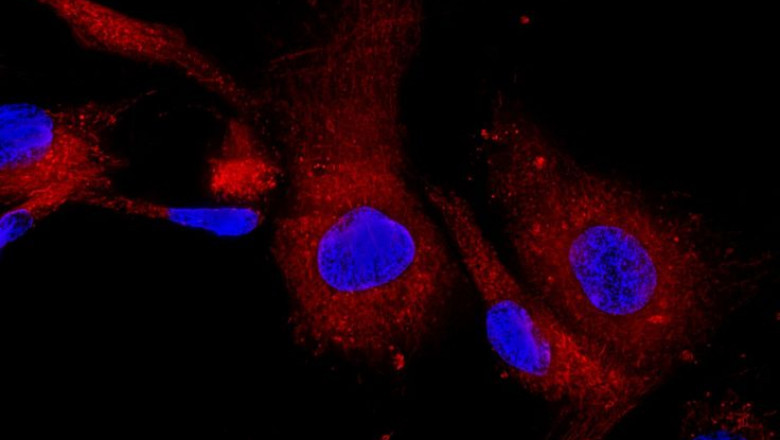views
Mesenchymal stem cells, also known as mesenchymal stromal cells, are a type of multipotent stem cell that can differentiate into a variety of cell types, including osteoblasts (bone cells), chondrocytes (cartilage cells) and adipocytes (fat cells). They are found in small quantities in adult tissues such as bone marrow, adipose tissue and umbilical cord blood.
In the bone marrow, they reside in a specific area called the perivascular niche, surrounding blood vessels. They were first discovered in the 1970s by scientists but weren't formally identified as mesenchymal stem cells until 1991. Since then, their therapeutic potential has been extensively studied and promising results have been found for various diseases.
Therapeutic Applications of MSCs
Mesenchymal stem cells have shown therapeutic effects in preclinical and clinical studies for many diseases due to their unique properties. Some of their main therapeutic applications are:
Bone and Cartilage Regeneration: Numerous animal and clinical studies have found that MSCs have strong bone and cartilage forming capabilities. They are being widely researched for treating bone fractures that are non-healing, bone defects due to injuries, osteoporosis and cartilage defects in joints.
Heart Disease and Stroke: Administration of Mesenchymal Stem Cells after a heart attack or ischemic stroke improves cardiac function and reduces damage to heart and brain tissues, likely through their paracrine actions and capacity to stimulate endogenous repair mechanisms. Clinical trials have demonstrated benefits for heart failure and stroke patients.
Graft-versus-Host Disease: This potentially life-threatening complication occurs when donor bone marrow transplant cells attack the recipient's body. Infusions of MSCs have been shown to prevent and treat GvHD in many patients through immunosuppressive and anti-inflammatory properties.
Blood Disorders: Conditions like leukemia involve corrupted blood and bone marrow stem cells. Early research indicates MSCs may help restore normal blood cell production in these patients through still unclear mechanisms helping repair bone marrow microenvironment.
Diabetes: Due to their pancreatic cell differentiation ability, MSCs offer hope for insulin-dependent diabetes treatment approaches involving cell-based therapies or engineering of insulin-secreting tissues from mesenchymal stem cells. Clinical trials are ongoing in diabetes.
Liver Diseases: Conditions such as cirrhosis, hepatitis and Wilson's disease damage the liver's ability to function properly. MSC transplantation was found to alleviate liver fibrosis, inflammation and improve liver function markers in preclinical studies through hepatocyte differentiation and secreted trophic factors.
Mechanisms of Action
While the exact mechanisms underlying MSC therapeutic potential remain under investigation, current research suggests they act through multiple pathways:
1. Differentiation: Under certain conditions, MSCs are able to differentiate into cells of mesoderm, ectoderm and endoderm lineages. They likely aid regeneration by differentiating into cells replacing damaged tissues.
2. Modulation of immune responses: MSCs suppress proliferation and functions of immune cells like T cells, B cells, NK cells and dendritic cells. This reduces inflammation and allows tissue repair in an immuno-privileged state.
3. Secretion of paracrine factors: MSCs secrete a wide array of cytokines, chemokines, growth factors and extracellular vesicles carrying bioactive molecules that provide cytoprotective, mitogenic and immunosuppressive signals promoting recovery.
4. Cell fusion and transfer of mitochondria: In some cases, MSCs may fuse with resident cells and transfer mitochondria and other cellular material contributing to tissues. However, this pathway alone cannot fully explain their therapeutic efficacy.
Advantages and Challenges with Clinical Translation
MSCs have immense potential but also limitations yet to be overcome. Advantages being their omnipresence in adult tissues, expandability in culture maintaining stemness and safety profile so far. However, large-scale production complying stringent guidelines, maintaining viability during processing and delivery along with proving efficacy in well-designed clinical trials against credible comparators remain challenges. Standardization of isolation/culture techniques and understanding their fate post-transplantation will be important to translate this promising therapy from bench to bedside in an effective manner.
Mesenchymal stem cells represent an exciting avenue for regenerative medicine and tissue engineering applications owing to their remarkable multipotent differentiation capacity and immune modulatory, trophic and anti-inflammatory secretome. While more research is still required, ongoing advancements continue yielding encouraging results, bringing us a step closer to novel medical therapies harnessing nature's most versatile endogenous repair cells.
Discover the Report for More Insights, Tailored to Your Language.
French German Italian Russian Japanese Chinese Korean Portuguese
Money Singh is a seasoned content writer with over four years of experience in the market research sector. Her expertise spans various industries, including food and beverages, biotechnology, chemical and materials, defense and aerospace, consumer goods, etc. (https://www.linkedin.com/in/money-singh-590844163)






















Comments
0 comment